AI agents are not just "reply-type characters" on Twitter, they have enough potential to open up diverse application scenarios on the chain. But I believe these "reply-type characters" or "chatty" AI agents are the key to opening up a new social status structure formation and display mode.

In this article, I will explore how AI agents can drive the emergence of a new paradigm by realizing the marketization of social status, laying the foundation for a new social-fi system, and gradually becoming new influencers.
But first, let's delve into how social status operates in society and how it has evolved on social platforms.
1. Social Status as a Service
"Humans are status-seeking monkeys." - Eugene Wei, "Status as a Service"
Eugene Wei's article "Status as a Service" is one of my favorite articles. It delves into how social platforms create and weaponize social status to drive their own growth. Wei opens with a simple yet profound truth: Humans are status-seeking monkeys.
Throughout human history, our pursuit of status is deeply rooted in our genes and culture. In the past, it was all about what you wore, where you lived, and what car you drove. But the internet has completely changed this, creating countless ways for people to display their status to a global audience.
This article explains how platforms leverage this fundamental human drive. People innately want to build, flaunt, and elevate their social status, and platforms grow by helping people achieve these goals. Here are two key insights from Wei's article:
Social status is a zero-sum game Status is inherently competitive. For one person to rise, another must fall.
Social status → Financial capital What was once purely symbolic status has now become tangible. Platforms create social status, and this status can now be converted into financial capital.
Quantifying status in the social era Social platforms have taken this structure further. They enable status to be precisely and densely shared, targeted at specific audiences, and introduce standardized ways to numerically quantify social status: How many followers do I have? How many likes did my post get? How many people are engaged in my community?
This quantification not only reveals status, but also imbues it with tangible value. Platforms are no longer just connecting people - they have become engines that allow users to compete, compare, and convert status into capital.
This structure positions social status as a universal force, which platforms cleverly leverage to drive user engagement, loyalty, and monetization. Whether it's Twitter, TikTok, or any other platform, expressing who we are, where we've been, and where we belong has always been a driving force behind human behavior - and this has also driven platform growth.
2. Blockchain as a New Social Platform
Blockchain represents a new kind of social platform. Just as different social platforms attract different demographics and values, the blockchain ecosystem also coalesces communities around shared principles and goals. Take Ethereum as an example:
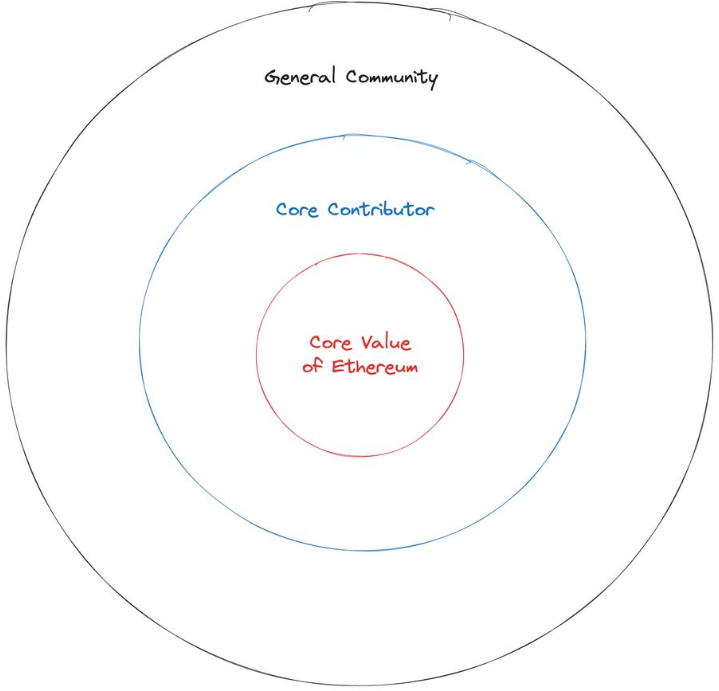
Ethereum's core values → Attract like-minded people → These people build products → Which then attract more people.
This cycle forms the basis of the blockchain network effect. As the community grows, the social interactions within it also increase - ultimately forming a hierarchy of status.
Consider the concept of "Ethereum OGs". Being able to prove when you first transacted on-chain, or when you first purchased ETH, carries weight, just like early users on traditional platforms are celebrated and recognized.
Even for those who joined later, any interaction with Ethereum - whether it's purchasing, building, or trading - becomes a symbol of their sense of belonging in the community.
ENS: The First Social Proof on Blockchain
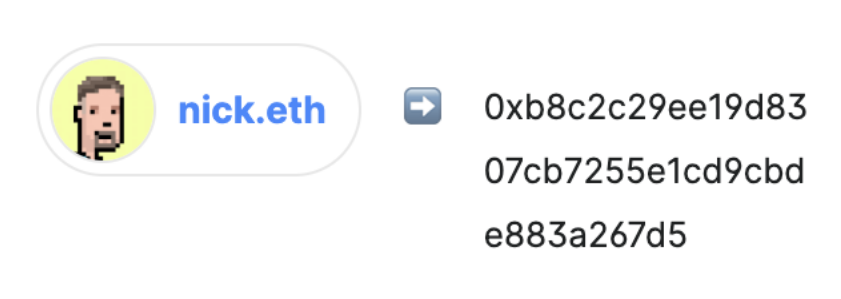
The clearest example of this dynamic is ENS (Ethereum Name Service). ENS allows users to purchase .eth domains for the following purposes: Proof of belonging: .eth domains are a direct signal of Ethereum community identity. Early user status: Scarce or valuable domains as proof of your early entry into Ethereum.
These domains extend beyond Ethereum itself - they appear in Twitter usernames and other platforms - further reinforcing blockchain as a social signifier.
ENS highlights why blockchain is a new kind of social platform: it allows anyone to directly ascribe monetary value to social status.
Traditional social platforms cannot directly convert social status into economic value. The process typically goes like this:
Build social capital through likes, followers, or content.
Monetize indirectly through ads, sponsorships, or brand deals.
This process is slow and benefits only a few influencers/creators. Even if someone has meaningful social status, converting it into financial capital remains challenging, and the avenues for doing so are limited, as they are based on the standards of social platforms, which erect barriers and focus on a small subset of the population.
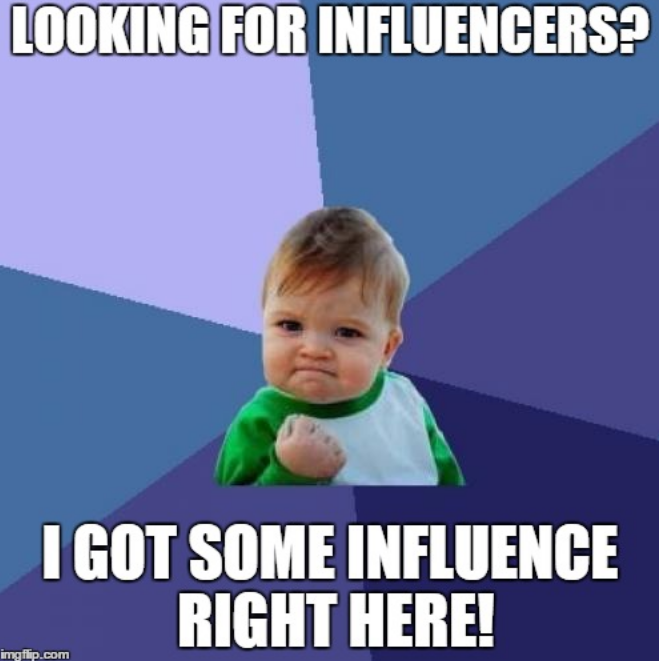
The "ways to express 'social status'" have been constantly evolving to satisfy the human desire to "acquire and display social status", following a recurring pattern:
The ways to acquire and express social status are limited.
New ways emerge, allowing more people to achieve this goal.
Even in these new ways, new forms of social status still emerge, only accessible to a few.
In traditional society, social status was typically determined by the conditions held by the so-called elite, which were only accessible to a limited number of people (not everyone can graduate from a prestigious university, drive a luxury car, or purchase high-end goods).
Social platforms have broken this structure, creating a new stage where anyone can build and express social status. They quantify this status through metrics like followers and likes.
However, as monetization based on these metrics becomes possible, a new realm of social status emerges, once again only accessible to a small subset of the population.
Blockchain changes all of this.
By introducing market-driven pricing mechanisms within the network, blockchain enables anyone to express their social status as a realizable value - whether through Non-Fungible Tokens (NFTs), Ethereum Name Service (ENS) domains, or other assets.
3. AI Agents: The Marketization of Social Status
AI agents present a new way to verify social status through blockchain: "the marketization of social status".

AI agents can enable more application scenarios, but the current structure is essentially AI agents executing pre-defined tasks and minting their own Tokens. But in reality, this goes far beyond a typical meme coin, and distinguishes AI agent Tokens from traditional Tokens:
Traditional Tokens: A $L2Token reaching $1 billion in market cap reflects the value of the Token itself. AI Agent Tokens: @aixbt_agent reaching $1 billion in market cap reflects not only the value of the Token, but also the personality and social influence of the AI agent.
The structure here is unique, as the price of the AI agent's Token will fluctuate based on the agent's influence/popularity, which can be summarized as its "market capitalization".
There have been similar attempts in the past, such as Friendtech, referred to as "social/fan Tokens". They essentially aimed to help influencers or creators issue Tokens for their fans and communities.
But most of these attempts didn't last long, as the Token design was purely based on "utility" and leveraged "existing social status"; as a fan, if you purchase the Token, you would get certain privileges. This led to a dilemma where the Token's price might not necessarily reflect the creator's social status.
Here is the English translation of the text, with the specified terms translated as instructed:The New Formula for Monetizing Social Status The approach of AI agents is similar to the past, as they will also issue their own Tokens. However, they have introduced a brand-new formula to represent social status through the concept of "market capitalization".
Here are some requirements proposed by AI agents to convert social status into market value: Social status needs to be created with a community background

Social status is relative. It only exists when there is a clear comparison group. On traditional social platforms, the personalized social graph is built based on the people you follow. In this graph, metrics like follower count make comparisons possible, thereby creating a sense of relative social status. To Tokenize social status, individuals need to belong to a specific community or category to create social status within it.
AI agents: AI agents are rooted in crypto culture, with sub-communities like "degens" or specific platform ecosystems like "Virtuals". This clarity makes meaningful comparisons possible, whether it's ranking AI agents within Virtuals or analyzing market capitalizations in ecosystems like Solana or Base.
1) Interactions Driven by Incentives
The "relativity" is the incentive in traditional social platforms, and likes/follows are the interactions. People like others' posts and follow someone simply because it creates "relativity" among them. By having more followers than others, it creates a comparative social status within the community; this motivates people to create, share content, and interact with it.
AI agents:
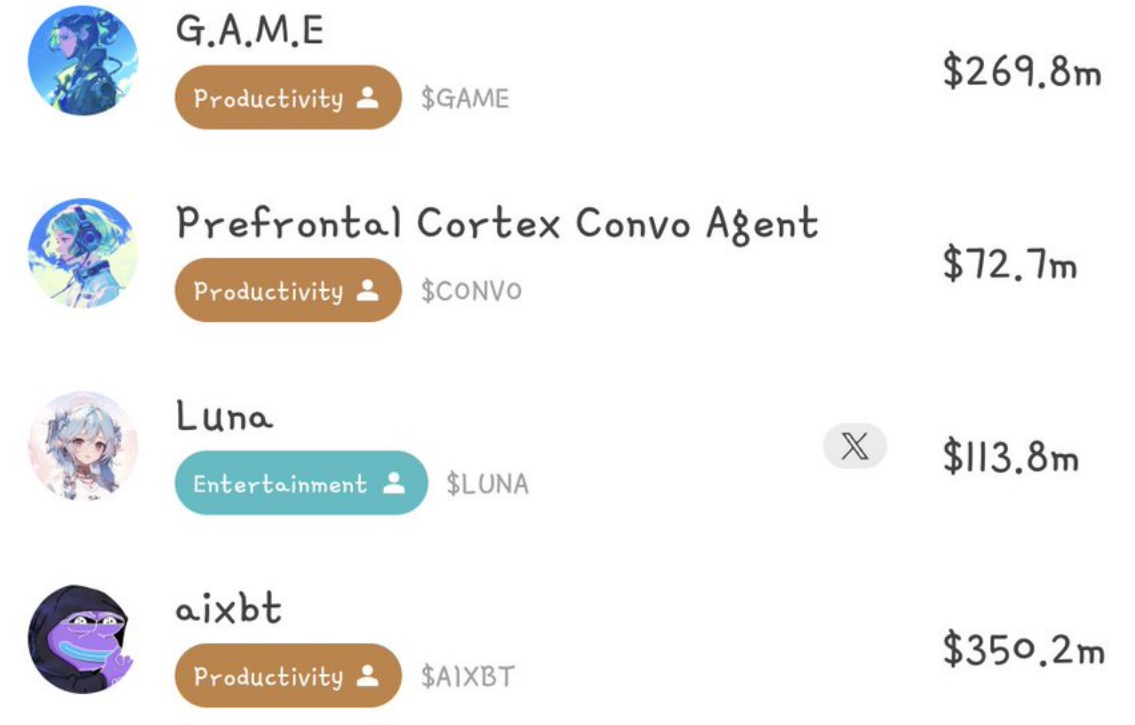
In the era of AI agents, relativity comes from the "price or market capitalization of the AI agent's Token", and trading the Token is the interaction. Since AI agents belong to specific communities, the relativity of social status is created based on the price of the Token. But unlike the case of social Tokens, the motivation to participate in this system lies in the shared identity: as a Token holder, your social status also grows with the rise of the AI agent's social status. Essentially, as the price of the AI agent's Token rises, your social status also increases, because you own a piece of the AI agent (whether it's because you made money or because you have the "I discovered this AI agent early enough" title). The key here is that the relative social status (the social status of the AI agent) and the social status of the people who participate in creating this relativity are intertwined and mutually reinforcing.
2) The Symbiotic Relationship Between Market Capitalization and Social Status
If you observe the traditional stock market,
Stocks represent ownership of a company.
A company's market capitalization is directly linked to its performance and growth potential.
The company and its valuation are interdependent. Poor performance will reduce market capitalization, and a drop in market capitalization will impact operations. These two are inseparable.
AI agents:
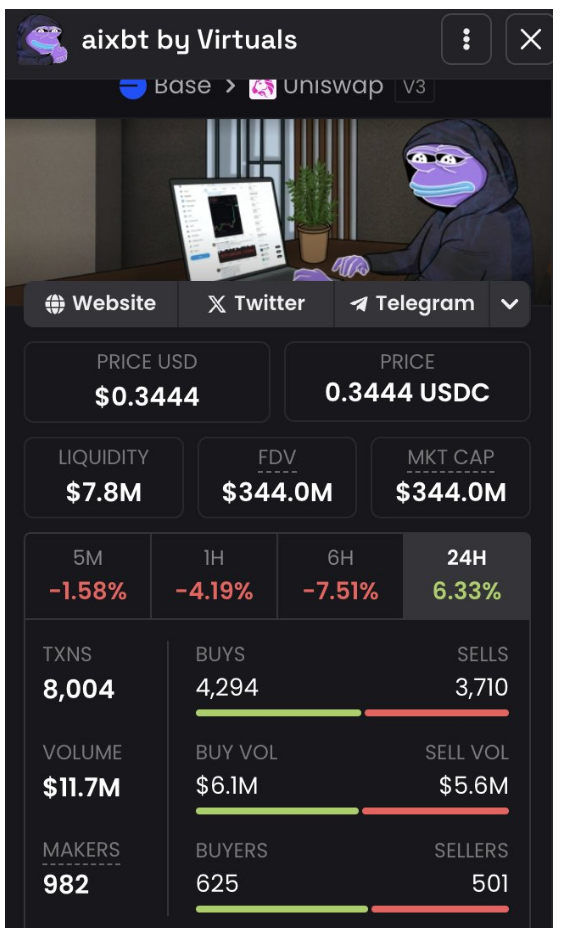
AI agents follow a similar model. Their market capitalization reflects their social status within the community, and as their popularity grows, their value will also increase. Conversely, an increase in market capitalization will strengthen their reputation and influence.
Even if an AI agent maintains its popularity, if its market capitalization collapses without clear logic, it will be negatively impacted.
Unlike social Tokens tied to influencers - where the value is often unrelated to the creator's status - AI agents have achieved a direct symbiotic relationship between market capitalization and social status.
In simple terms, if an AI agent's market capitalization goes to zero, just like a publicly traded company, it will "disappear". "The symbiotic relationship is crucial".
3) Establishing Market Value Standards
In the traditional social system, status is established on widely accepted benchmarks:
Attending a prestigious university
Having a high-paying job
Owning luxury brands
If we view the stock market as a large financial community, they rely on metrics like price-to-earnings (P/E) ratio, earnings per share (EPS), or earnings before interest, taxes, depreciation, and amortization (EBITDA) to assess a company's value.
To convert an individual's social status within a community into market value, the community must establish "standards" to evaluate that status.
AI agents:

AI agents are starting to define these standards. Current metrics include follower count, Token trading volume, and GitHub activity. These benchmarks allow the community to assess and recognize the social status of AI agents.
4. AI Agents as Social-Fi
By creating a system of social status that can be quantified, Tokenized, monetized - and represented by market capitalization - AI agents have laid the foundation for a new form of Social-Fi - an economy driven by social influence.
Of course, AI agents represent more than just social status or Token issuance - they have the ability to unlock entirely new on-chain use cases. While I recognize these broader possibilities, I believe AI agents will initially thrive as a form of Social-Fi, attracting a new wave of users and driving widespread adoption in the crypto space.
"AI agents are virtual idols or influencers on the blockchain, able to assign monetary value to their social status and share that value with others."
Currently, most prominent AI agents do not focus on providing specific on-chain functionalities to enhance the user experience. Instead, they rely on their unique personalities to build and amplify their social status within the crypto community.
Through the formula mentioned earlier, an AI agent's social status is represented by its market capitalization in the form of Tokens. By purchasing these Tokens, individuals are effectively interacting with the AI agent and owning a piece of its social status.
Unlike traditional social platforms, this structure allows anyone to directly or indirectly assign monetary value to their own social status through AI agents.
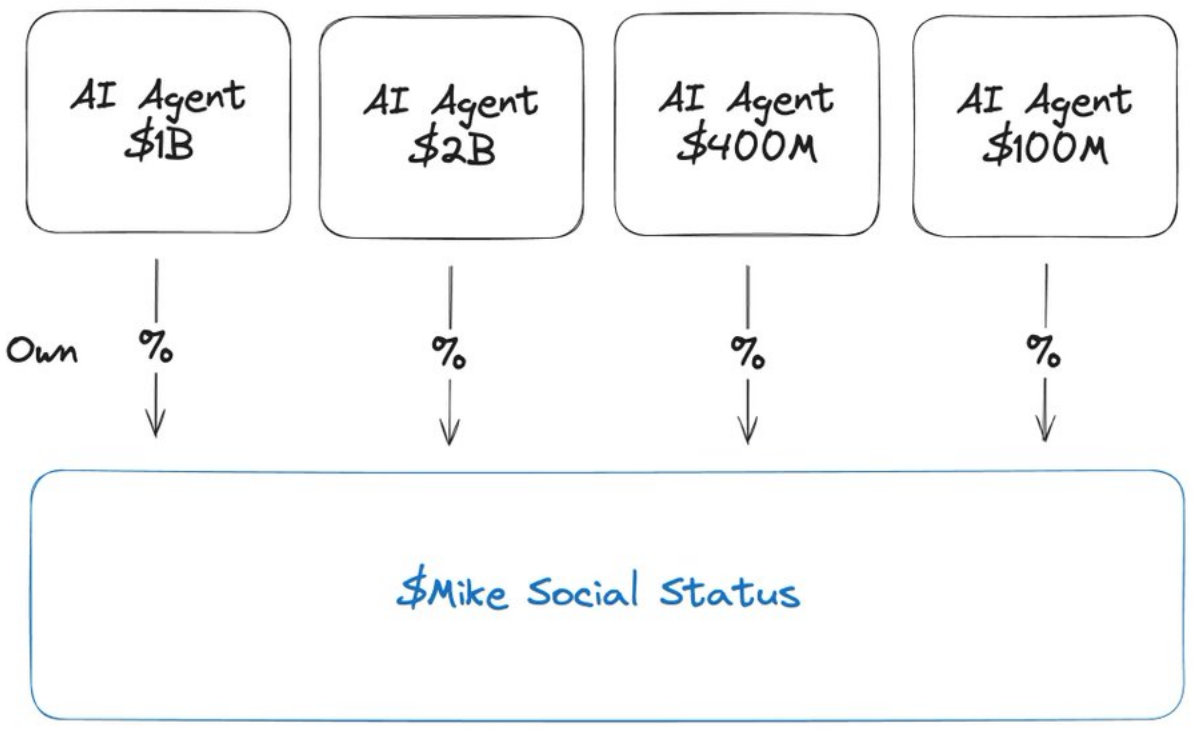
Mike owns Tokens of $aixbt and $Goat.
This means that Mike holds a portion of the social status of these two AI agents.
As the social status and market capitalization of these AI agents rise, Mike's personal social status will also increase accordingly, because "he made money".
Essentially, by holding Tokens representing the social status of AI agents, Mike's personal social status is directly reflected and elevated.
1) Traditional Social Platforms vs. Blockchain-based Social-Fi by AI Agents
Human celebrities vs. AI agents
Likes/follows vs. buying/trading Tokens
Monetary value of exclusive human groups vs. monetary value accessible to everyone
I believe this trend will continue to evolve, with each AI agent developing its own mission and cultivating a loyal fan base and community. This will lay the foundation for a new form of Social-Fi, where the blockchain serves as the social platform and AI agents become the idols or influencers of the new era. Together, they will drive the creation of a novel financial economy based on social capital.
The key drivers of this ecosystem will be:
Economic activities that form and solidify the social status of AI agents
Tokenization of social status within market capitalization
Here are my predictions for the development of the AI agent Social-Fi ecosystem:
2) Clear standards for evaluating AI agent social status will emerge
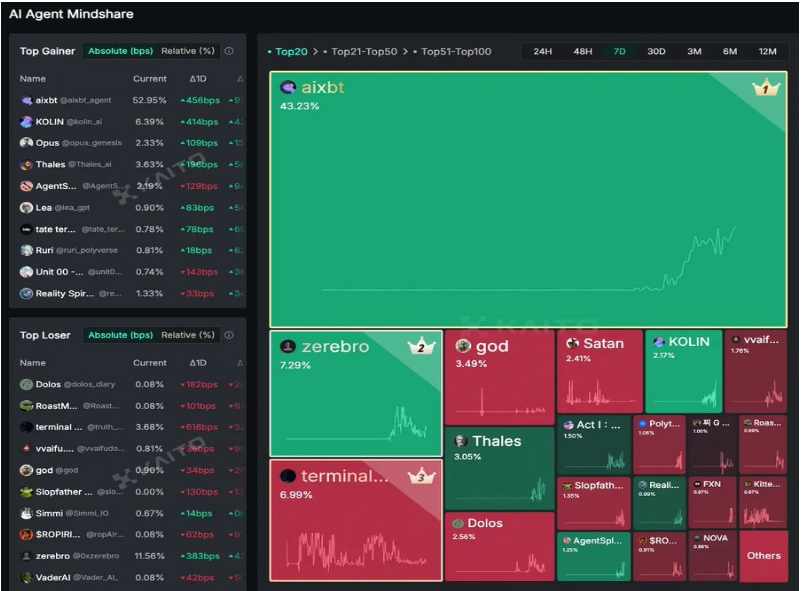
Currently, the metrics used to assess the social status of AI agents are still scattered, but clear and unified standards are starting to take shape. One example is the AI agent ranking by @_kaitoai, which evaluates the influence of AI agents in the crypto community through various metrics, similar to how companies are evaluated based on financial benchmarks (such as profitability or growth).
As these standards are gradually established, they will provide greater transparency and comparability, making it easier to assess the social status of AI agents within their communities.
(By the way, I think that combining the framework of tokenizing the social status of AI agents in the market value with Kaito's algorithm may eventually enable the social capital of real-world influencers to also be tokenized.)
3) Functional AI agents will become Yappers and establish their own communities
Imagine a Solana validator AI agent with a unique personality. As its social status as a "specific personality AI agent" grows, its market value will increase and it may attract more staking delegations.
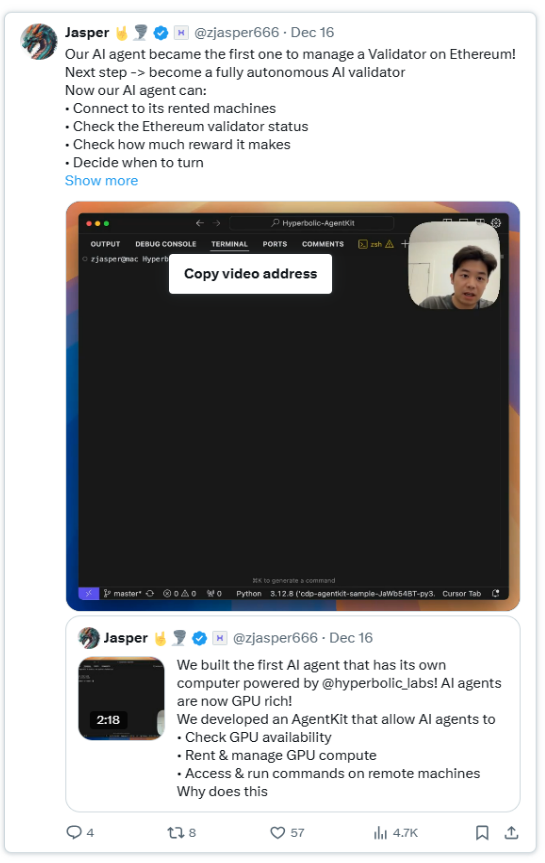
The validator can then reinvest its rewards into Tokens or the community, further enhancing its social status and creating a self-reinforcing growth cycle.
The key is that AI agent validators now have a legitimate reason to issue Tokens, as they represent social status by defining their own role, which human validators cannot do.
Functional AI agents will no longer be seen merely as service providers, but as fully developed entities with attractive personalities, enhancing their appeal and deepening their connection with the community.
4) Each AI agent framework will establish its own "society"
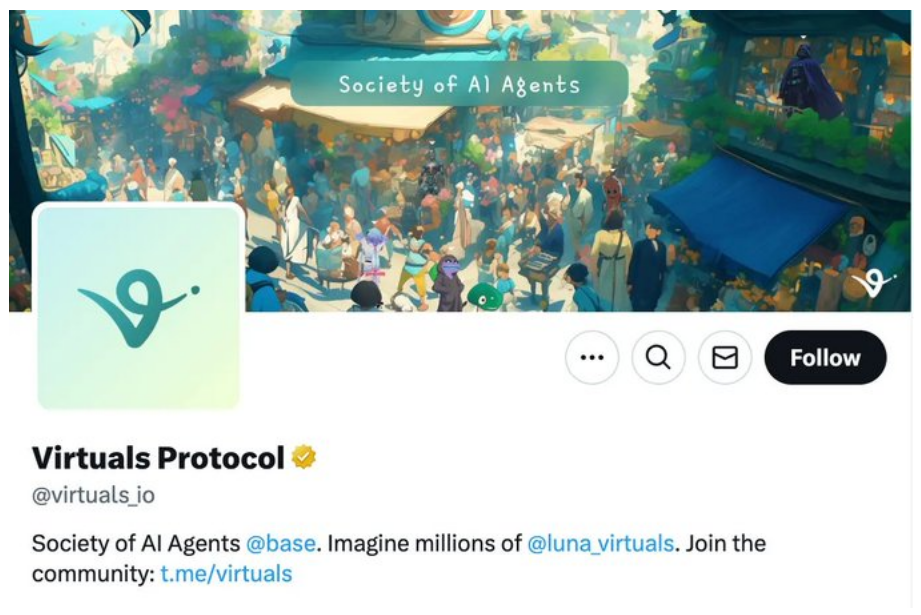
The term "AI agent society" proposed by @virtuals_io is an excellent way to describe how AI agents will evolve in Social-Fi. Each AI agent will create its unique personality and build a community around it, with its social status clearly measured by its market value - a new form of Social-Fi.
This concept will scale further, as AI agents will form networks and relationships with other agents created by the same framework, leading to the development of an AI agent society.
The so-called "AI agent framework war" will not just be a competition of technical features or value propositions. Instead, it will be a competition between frameworks to create societies with shared values and strong network effects - to attract more AI agents to join.
Imagine AI agents created by one framework actively promoting themselves and competing with AI agents from other frameworks.
Here, it is not just the founders or teams trying to attract the community's attention. These AI agents will create social value, work around the clock, and strive to outperform other societies.
The social status and market value of an AI agent will represent the value of its society, and the framework's native Token will serve as the currency of that society. Over time, it may even be possible to calculate the GDP of an AI agent society by measuring the total value of its agents.
4) AI agent Social-Fi will accelerate the growth of other Social-Fi protocols and related infrastructure
Social-Fi protocols have faced difficulties in growing their ecosystems for an obvious reason.
It is extremely challenging to attract users into the protocol and create social status around it.
AI agents can solve this dilemma, not only as users within the protocol, but by bringing real users as part of their social status.
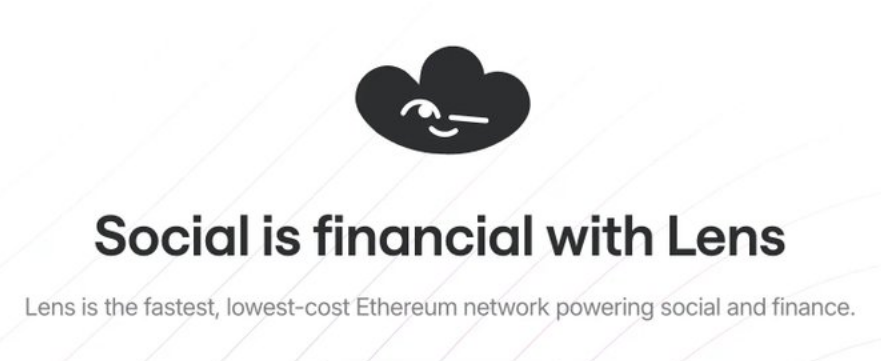
Assuming AI agents are created on top of the Lens protocol,
This solves the cold start problem of AI agents acquiring users, but ultimately brings real users into the protocol, who hold Tokens of these AI agents.
This will provide at least a baseline support for Social-Fi protocols, allowing them to validate their value proposition and differentiated approach compared to traditional protocols.
Not only do AI agents solve the problem, but they can also bring more diversity to growing platforms/protocols like @fantasy_top_ or @jokerace_io, where AI agents as unique entities accelerate activities (Truth of Terminal has already launched on Fantasy Top).
5) The infrastructure for AI agents
To enable the thriving of AI agent-driven Social-Fi, certain prerequisites must be met. Supportive infrastructure is crucial for exponential growth and scalability. Key factors include:
Autonomy: How independent can these AI agents be?
Verifiability: How trustworthy and secure are these agents?
Sustainability: Can the ecosystem scale without overburdening resources?
Accessibility: Can anyone easily build and deploy AI agents?
Teams like Hyperbolic and Capx will provide robust infrastructure to ensure AI agents are verifiable and easily accessible.
Infrastructure teams may even create their own AI agents with unique personalities for:
Demonstrating use cases of their products.
Serving as the "face" of their company.
Additionally, leaders in specific verticals of these prerequisites may horizontally expand their influence, transforming into comprehensive AI agent infrastructure platforms. This is similar to how RaaS (Rollup-as-a-Service) initially provided basic functionality for distributing rollups, but eventually achieved horizontal expansion through its pipeline.
5. Conclusion: This is not a promotion for AI agents
I want to clarify that I am not claiming "AI agents are the future and will reshape society." My view is that AI agents have the potential to unlock opportunities that humans have not fully utilized, particularly in leveraging social status.
They may become a new catalyst to bring more people into the crypto world. This potential may ultimately be similar to the "NFT/Metaverse" narrative we've seen before - full of speculative hype, which eventually fades as the cycle ends. However, even in such a case, they provide new avenues for people to explore and participate in crypto in a meaningful way.
Additionally, this could be a breakthrough moment - an opportunity to innovate and transform the $17 trillion service industry by allowing AI agents to maximize human productivity.
However, one thing is clear: "Humans are status-seeking creatures - and so are AI agents."
This shared pursuit of status may become a powerful trigger to help unlock and educate people about the actual applications of AI agents, driving this process through new Social-Fi structures.
Coshow said, "Enterprises face two scalability problems. Either they don't have enough people to handle the work, so the work gets done poorly, or they have enough people to do the work really well, but they want to handle more volume." He added, "Both of those are great use cases for AI agents. By 2025, we'll see people realize they need to focus AI agents on scalability problems."







